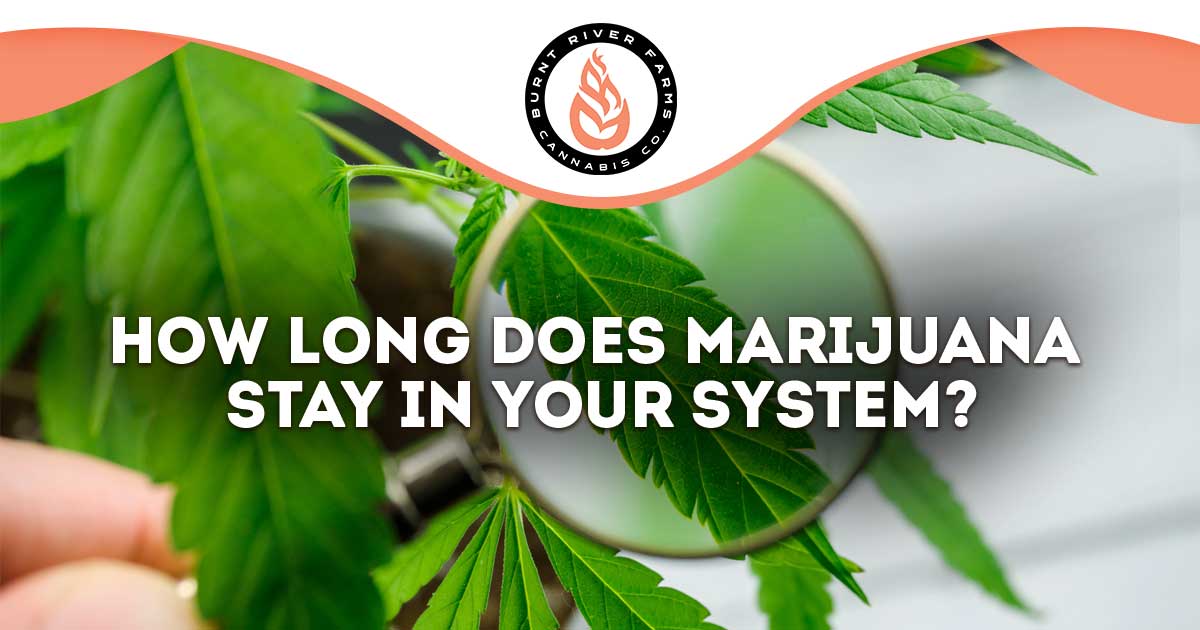How Long Does Marijuana Stay in Your System?

As marijuana becomes more mainstream and publicly accepted, more people find themselves interested in what it does and how it works. One of the most frequently asked questions about marijuana use is regarding the duration of the effects. People want to know how long marijuana stays in their system for a variety of reasons.
The answer is more complicated than you might think. There are a lot of factors that contribute to just how long marijuana will stay in your system, and how long you’ll feel the effects of the drug. We’ll address both of these to help you better understand how your body reacts.
How Does Cannabis Travel Through the Body?
Whether you’re using cannabis recreationally or for medical reasons, it’s important to understand how long it remains in your system. You would never want to be in a situation where marijuana is compromising your safety, the safety of your family or friends, or anyone else. Being aware of the duration of the effects is one part of responsible marijuana use. You can use weed for the benefits without being reckless.
When you consume marijuana, you’ll typically feel the effects rather quickly. If inhaled, then you can expect to feel them in about 30 minutes to an hour. If you eat a marijuana edible, it usually takes a little longer – about an hour or two. This is when THC levels peak. It’s also when you’ll experience the feeling of being high.
The high itself has the potential to last several hours. However, this depends significantly on the amount used as well as its potency. You can generally expect the high to wane somewhat after the initial hour or two.
After the marijuana enters your bloodstream you may feel a sense of euphoria. Many people experience relaxation while others laugh or giggle more. It’s also common to experience increased appetite during this time.
Marijuana use can also lead to some adverse side effects including feelings of paranoia and/or anxiety. In rare instances, it can cause nausea or vomiting.
Key Factors that Influence How Long Weed Stays in Your System
Once THC is in your system, there are a few things that determine how long it will remain there. While the feeling of being high may pass relatively quickly, THC, or tetrahydrocannabinol, can last in the human body for several days or even weeks. While other substances such as alcohol can completely disappear from the body in a matter of hours, THC lasts significantly longer.
The amount of time it stays in the body and has the potential to show on drug tests depends on many things including:
- Quantity consumed
- Frequency of use
- Genetics
- Fat
- Metabolism
Saliva tests typically can only detect THC for a few hours due to the way the body metabolizes it. This chemical is lipid-soluble which means it will bind to body fat. This accounts for part of the reason it takes so long for your body to eliminate it.
Dosage
When people ask how long marijuana lasts in their system, they generally mean THC. Therefore, the amount of THC consumed clearly plays a role. Not to mention that the effects are cumulative, meaning that they add up over time. Someone who uses marijuana frequently tends to have higher concentrations of THC than someone who doesn’t.
Marijuana also varies in potency. Without extensive testing, it’s difficult to determine how strong any particular marijuana is. One would think that stronger symptoms would indicate stronger weed. However, there are other factors in addition to THC that can either intensify the feeling of being high or subdue it.
Frequency of Marijuana Use
Evidence indicates that the amount of time THC remains in your system is strongly influenced by how often you use marijuana, how much you use, and if you’re a long-time user. For example, if you use marijuana regularly, then stop for a few weeks, you’re more likely to have THC in your system than someone who rarely uses marijuana, even if they used it more recently.
Typically, if someone smokes marijuana for the first time then THC may stay in their system for around three days. Whereas someone who smokes marijuana a few times per week may have it in their system for up to a week after they stop. Also, those who smoke marijuana at least once a day may have a detection window of over 30 days.
Genetics
In addition to dosage and frequency, gender plays a role in how long THC remains in the body. Women typically metabolize the chemical at a slower rate than men. This is because, in general, women tend to have higher levels of body fat than their male counterparts.
Fat
Since THC stores in fat cells, people with higher concentrations of body fat tend to metabolize the chemical more slowly than someone with less body fat. This means that not only gender, but BMI plays a role in how long it stays in your system. Higher amounts of body fat mean it leaves your body much slower. Even if someone with higher body fat were to stop using marijuana, it may still be detectible longer than someone with lower body fat.
It is important to note that BMI, or body mass index, is only one way to determine the amount of body fat you may have. Keep in mind that weight will also increase with any muscle mass, which can skew BMI numbers.
Studies have also shown that exercise can cause fat cells to release THC. This means there could be an increased chance of detectability after exercising.
Metabolism
Another factor in THC retention is your metabolism. How fast or slow your metabolism is can also dictate how long it will remain in your system.
Metabolism rates change widely depending on age, physical activity, health conditions, and much more. People with a higher metabolism tend to clear the THC from their bodies much quicker than those with a slower metabolism.
Overall
When it comes down to it, there is no perfectly accurate way to predict just how long it will take your body to metabolize THC and clear it from your system. Even if you figure out how long it takes one type of marijuana to get through your system, another type may take longer. It’s something that no one has been able to pin down quite yet.
For most people, the THC should be in very low concentrations within 30 days of use. For people who use marijuana infrequently, there’s a possibility it might take 10 days or less.
Regardless, if you need to know if THC is out of your system, home tests are available to help give you an idea. People may need to know this if they’re applying for a job with an employer who has rules against marijuana use, or a number of other reasons.
Just make sure you’re researching which tests you use to find out if they’re reliable or not.
It’s also important to practice safe and responsible marijuana use but ensuring you’re not putting yourself or others at risk during the initial effects of using marijuana.
